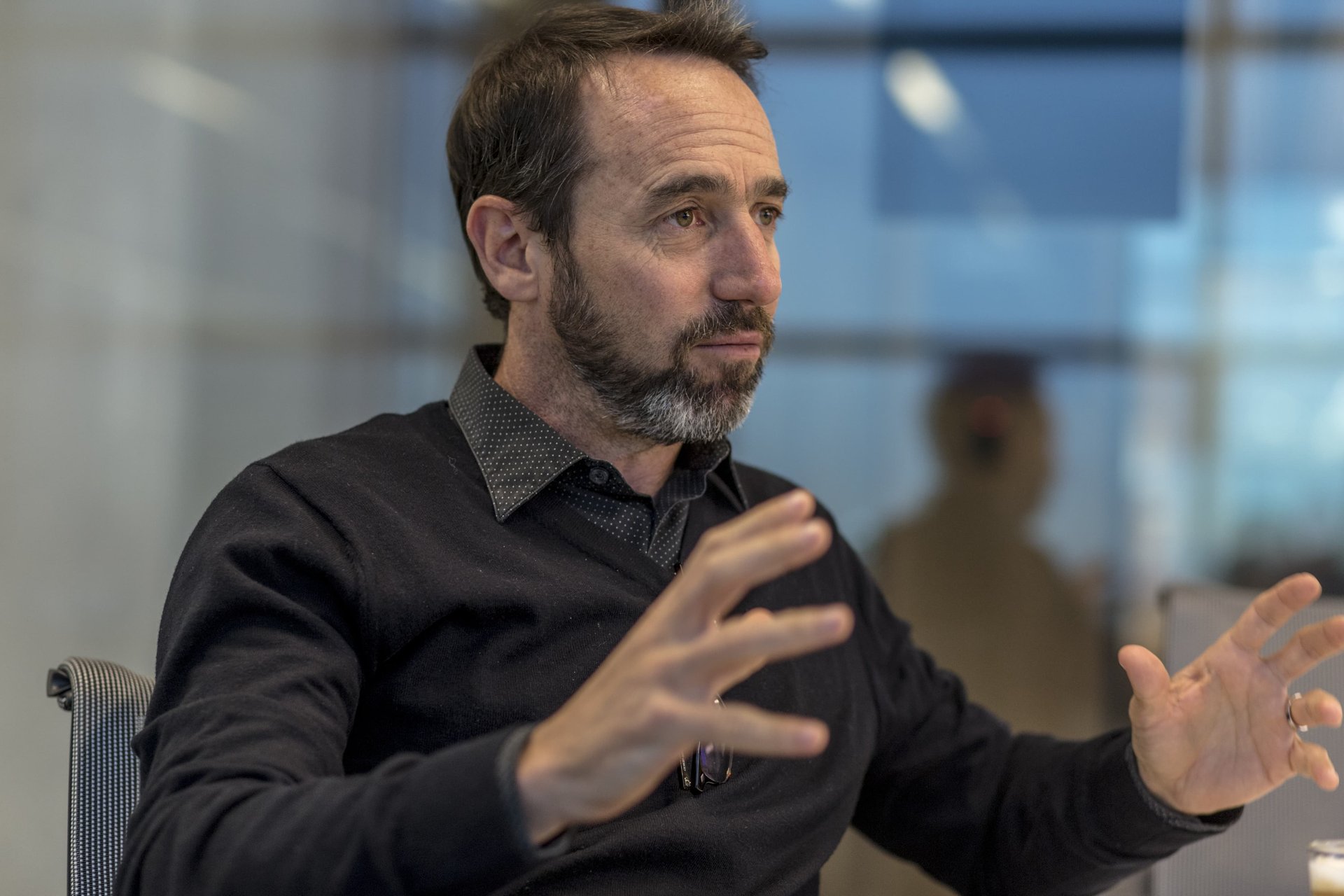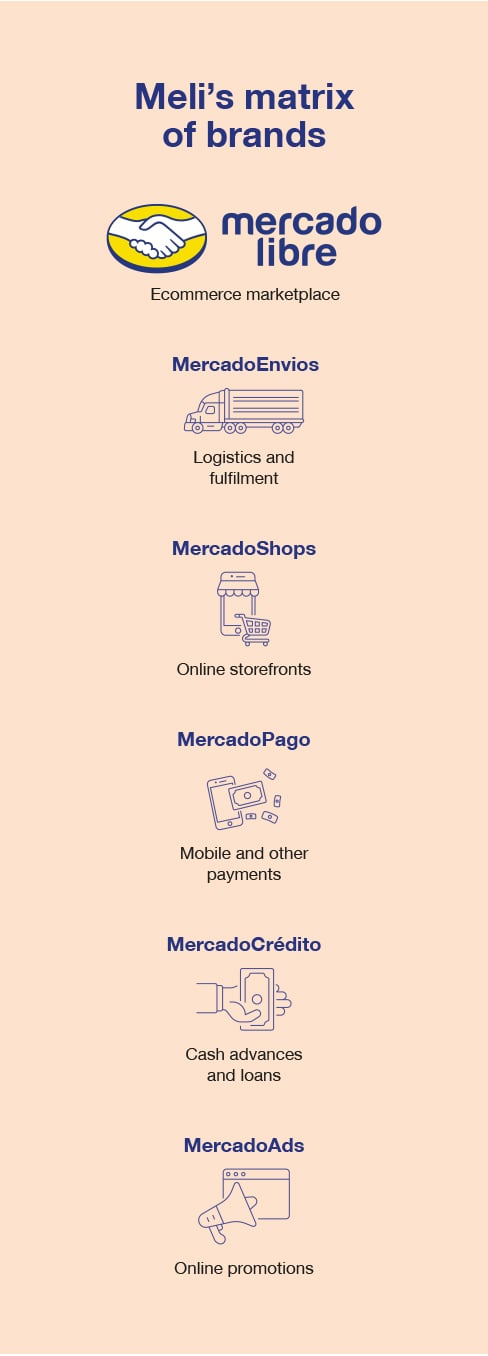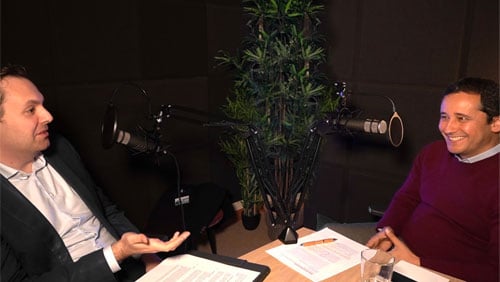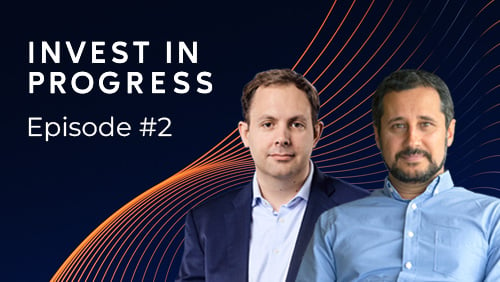May 2022
Article
MercadoLibre: the fintech liberating financial services and ecommerce
Richard Lapper
Building an ecommerce empire was just the start for Argentina’s MercadoLibre, Lawrence Burns, deputy manager of Scottish Mortgage Investment Trust, tells Richard Lapper.

llustration by the Balbusso twins
Please remember that the value of an investment can fall and you may not get back the amount invested. This article originally featured in Baillie Gifford’s Spring 2022 issue of Trust magazine.
Of all the many revolutions in Latin America’s history, this may be the least heralded but most beneficial: the disruption of an elitist, profit-gouging banking establishment brought about by an upstart online shopping platform – MercadoLibre.
“In most Latin American countries, you’ll find an oligopoly where three or four banks control 80 per cent of the market, catering only for the wealthy and charging some of the highest fees in the world,” explains Lawrence Burns, deputy manager of Scottish Mortgage. “Even going into some banks means passing through security airlocks and metal detectors. You’re seen more as a threat than as a customer.”
MercadoLibre – meaning ‘free market’ – has delivered reliable, low-cost financial services to all, including the previously unbanked, via mobile apps. In doing so, it has allowed millions more across the region to pay and be paid, to borrow, lend and invest.
“It’s not so strange that you’re seeing one of the world’s most valuable financial technology companies emerging in one of the world’s most customer-unfriendly financial markets,” Burns reflects. “As many as 30 per cent of Brazilians and 60 per cent of Mexicans don’t have bank accounts, and if you move on to credit card penetration it’s even more dire, with Brazil below 30 per cent and Mexico about 10 per cent. There was a big opportunity for disruption.”
Burns first covered Latin America as a new Baillie Gifford recruit in 2010. “There were still a lot of unknowns about the company when we invested, but the conviction we formed about the people and the culture has only grown in the decade since,” he says.
“The fact that the business is founder-run with chief executive Marcos Galperin still at the helm, supported by long-standing executives such as chief financial officer Pedro Arnt, is very important to Scottish Mortgage,” Burns adds. “Its culture is manifest in a willingness to delay profitability and invest in building up the platform. That’s hard for any company. However, its time horizon is the next 15 years, not just the next three or four. It wants to build a legacy.”

In that time, MercadoLibre, or Meli, has grown to challenge the region’s oil and mining giants as the most valuable company in Latin America. Its dominant position is strengthened by the region’s disincentives to competitors: protectionism, a tendency to hyper-inflation and immoderate politics. Even the all-conquering US and Chinese web giants have hesitated to commit fully, allowing Meli to consolidate its leadership.
From an ultra-modern block next to the concrete spaghetti cluster of Buenos Aires’ main highway interchange, MercadoLibre’s operations spread throughout the region’s nations and business sectors. As well as its original Marketplace trading platform, Meli’s sub-brands include MercadoPago, a fintech platform; MercadoFondo, an investment platform; MercadoCrédito, a loans business; and MercadoEnvios, a logistics service. Further offshoots include MercadoClassifieds, MercadoAds and MercadoShops.
Burns relates how, as an MBA student at Stanford University in the 1990s, Galperin watched the growth of online marketplaces such as eBay and decided to apply the model back home. Although eBay was an early shareholder, Galperin and his colleagues leapfrogged its second-hand auction model, setting up a digital home for traders and small businesses. Today, the offering stretches from megabrands such as Apple and Nike to the mom-and-pop traders previously hawking their wares in dusty market squares across South and Central America. One promotional video features an Argentinian smallholder called Veda Palevicino, who has turned her skill at weaving wool for ponchos and saddle blankets into an online business. She describes her hope that she can transform her life from that of a goatherd into that of a small businesswoman, while helping to preserve a folk tradition.
Revenue from sales and advertising had been growing steadily during the 2000s as the company rolled out operations to Brazil, Mexico, Colombia, Uruguay, Chile and Venezuela. The strengths of the ecommerce platform came to the fore in the pandemic, with sales doubling year-over-year in the third quarter of 2020.
Meli advanced by conducting controlled operational and sales experiments in single countries before applying them groupwide. Developing the MercadoPago payment system dramatically increased the market by allowing even unbanked customers to buy in instalments. The resulting merchant and customer data helps the firm sell other financial products in a “more natural way”, Burns says, than rivals such as Amazon.
MercadoCrédito has significantly grown the Latin American lending market. About 40 per cent of its merchant borrowers have never taken out a loan before. The loan book has more than tripled in value to $1bn over the last 12 months, an increase that followed the doubling of the group’s market value in 2020. That lending success has enabled the firm to amass valuable new proprietary data on customer creditworthiness.
“It’s usual for ecommerce marketplaces to give birth to dominant payment platforms,” explains Burns. “In China, the big players have been able to leverage that data into a much broader financial platform, and we’re seeing something similar with Meli.”
Also key to its long-term plans is logistics business MercadoEnvios, whose success defies the norm in a region where strikes, delays and transport chaos are almost taken for granted. MercadoLibre has turned itself into “a world-class logistics fulfilment operation” by investing heavily in acquisitions and partnerships, distribution and software infrastructure, plus its own fleet of seven aircraft.
Burns is impressed: “Now 80 per cent of its deliveries are made within 48 hours, which was impossible five years ago, at least outside São Paulo or Rio. Not only has the company had to manage the increase in the scale of goods going through the network because of Covid, but it’s also increased efficiency and speed of delivery at the same time. It’s a remarkable feat.”
Along with broadening financial inclusion, another wider indirect benefit of the firm’s success has been the nurturing of what Burns calls a “regional tech ecosystem”, helping to attract and build a self-sustaining pool of skilled engineering and programming talent in Latin America.
“You’re seeing a greater range of companies now being formed, and that’s creating a virtuous circle. The more companies succeed, the more people want to have a go at building their own company.”
New players such as the Colombian delivery and ecommerce company Rappi and the Brazilian online bank Nubank have emerged and grown impressively.
Burns acknowledges that the region’s economic and political volatility could impact MercadoLibre, but his conviction stands. “This is a company at the forefront of the secular shift to the online world. Even in unstable macro and political conditions, it can create huge amounts of value both for society and for shareholders. Meli is democratising commerce and promoting financial inclusion, and that can only be a good thing.”
This article first appeared in the Spring 2022 issue of Trust, Baillie Gifford’s bi-annual investment trust magazine. To register for a free copy, delivered to your door or to your inbox please visit bailliegifford.com/trust

About the author - Richard Lapper
Richard Lapper is a freelance writer. A former Latin America editor at the Financial Times, he is an associate fellow at the Royal Institute of International Affairs in London.
Important information and risks
Investments with exposure to overseas securities can be affected by changing stock market conditions and currency rates. The Trust invests in emerging markets where difficulties in dealing, settlement and custody could arise, resulting in a negative impact on the value of your investment.
The views expressed in this article should not be considered as advice or a recommendation to buy, sell or hold a particular investment. The article contains information and opinion on investments that does not constitute independent investment research, and is therefore not subject to the protections afforded to independent research.
Some of the views expressed are not necessarily those of Baillie Gifford. Investment markets and conditions can change rapidly, therefore the views expressed should not be taken as statements of fact nor should reliance be placed on them when making investment decisions.
Baillie Gifford & Co Limited is wholly owned by Baillie Gifford & Co. Both companies are authorised and regulated by the Financial Conduct Authority and are based at: Calton Square, 1 Greenside Row, Edinburgh EH1 3AN.
The investment trusts managed by Baillie Gifford & Co Limited are listed on the London Stock Exchange and are not authorised or regulated by the Financial Conduct Authority.
A Key Information Document is available by visiting bailliegifford.com







